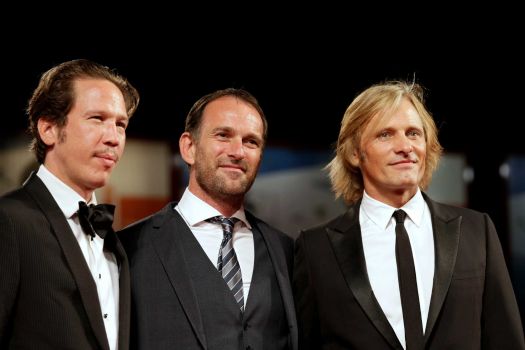David Oelhoffen Talks ‘Loin des hommes’ (Far From Men)
We are in Algeria in 1954, a time when the rebellion is steaming up. Two men from opposites sides of the fence find themselves in the circumstances of having to flee together across the Atlas mountains. Daru, played polyglotly by Viggo Mortensen, is a teacher who has to escort a villager accused of murder, Mohamed, interpreted by Reda Kateb. The two fellows will confront the unknown together in pursuit of their freedom.
French director Daivid Oelhoffen describes the making of his latest film, running for 2014’s Golden Lion:
How did ‘Far From Men’ work out as an adaptation of an Albert Camus’ story’ ‘The Guest’?
I felt very free, since the story was very short I had a lot of liberty in adapting it. That is why I never considered it as a sacred piece: I was forced to change it. Catherine, Albert Camus’ daughter was very supportive and she encouraged me to do exactly what I wanted, in order to make a film out of it. But I actually fed my screenplay with Camus’ material, discovering his journalistic essence and his writings of the ‘30s, like ‘Algerian Chronicles’. This allowed me to feel very free, because I was still getting my inspiration from Camus itself.
How about the political implications in the story?
What interested me was the relation with current affairs. From the very beginning, when I read the short story I realised the strong bond with our present times. I immediately felt that Camus was talking about nowadays. Naturally the form of conflicts are quite different and wars: we are no longer into post-colonial conflicts like in the ‘50s. The reasons for wars are different, but what is the same, is the situation of the people that suffer, as well as the position of people who try to have a humanistic approach in finding solutions within these conflicts. I believe that there are many Darus all over the world and in countries where there are currently wars, like the west-winged people in Israel, but no one listens now because violence is everywhere.
So Daru’s character embodies a saviour…
Daru is a very moving character to me, because he wants to help Mohamed but ends up being helped by him too. It’s not a one-way story, it’s reciprocal. He hasn’t got a clear view in the life he’s leading and through this adventure he realises that he has to actually live. Daru is quite naive in the beginning and has chosen to distance himself from the world and live in a very isolated environment in order to protect himself, but history catches up with you, no matter where. So he’s forced to go back to life.
Production-wise what were the greatest challenges?
It’s humbling to shoot in the desert: the weather is unpredictable. It’s an extraordinary experience, the weather can be very hot as well as extremely cold. But you do feel the energy of such an environment. We were very lucky, the desert was a good companion: when we need rain it rained, when we need wind there was wind, when we need fog we were given fog. We also made the choice to shoot in natural light so we had to let the sun dictate are schedule.
How was Viggo’s preparation to fit into character?
Viggo is an exceptional professional. When he accepted to make the movie, he asked for time to prepare. He needed a year and a half to perfect his French accent, although he already handled the language excellently. He also wanted to get familiar with Algeria and learn the language and get familiar with Camus’ work. Physically he wanted to lose some weight. That’s the way he works: he needs to prepare himself in all aspects.
Since the topic may be taken as controversial do you fear the general public’s response?
I had no fear when I was making the film. Now I simply hope the audience will love the film, the way we made it and it won’t raise any controversies, considering its delicate issue.

